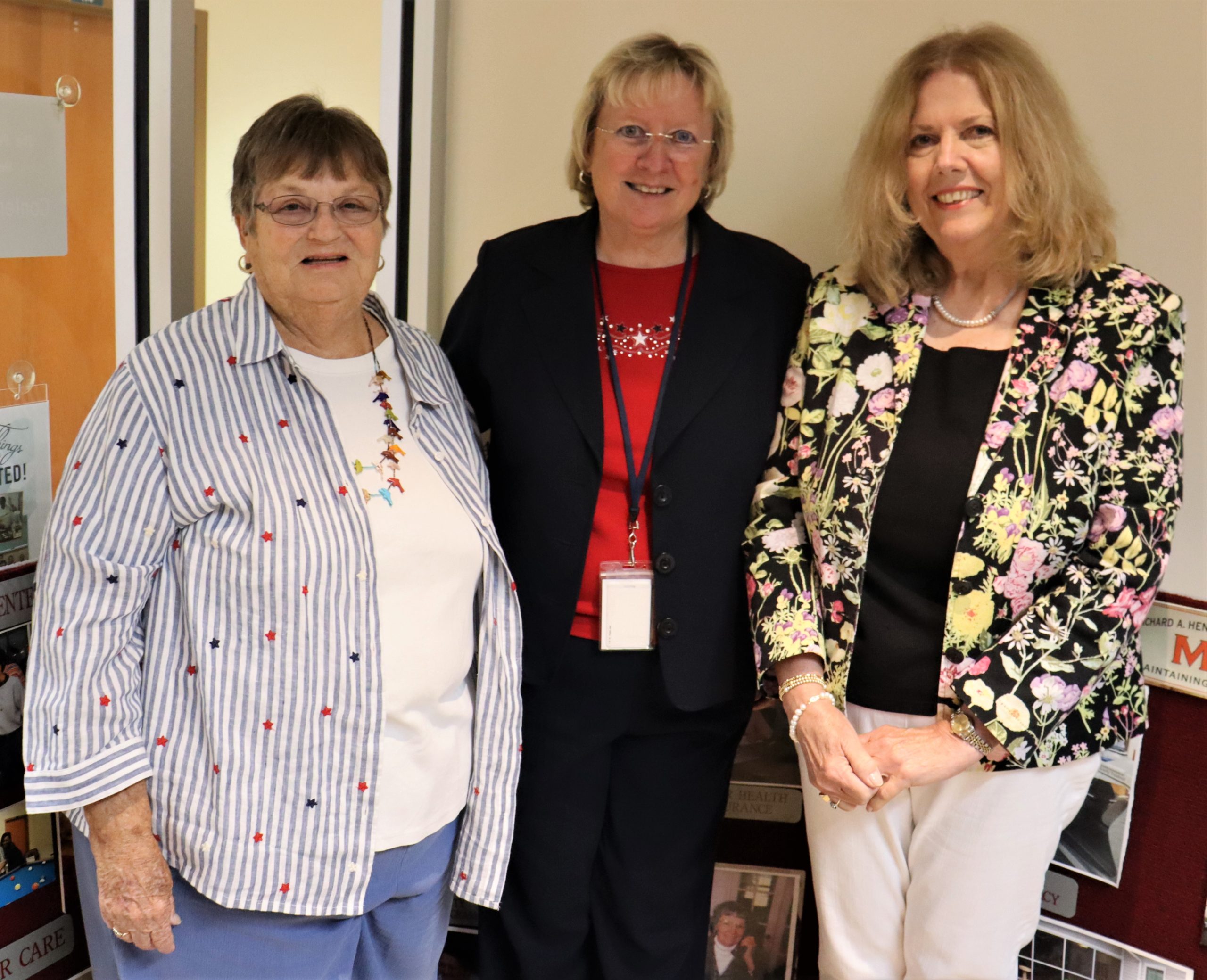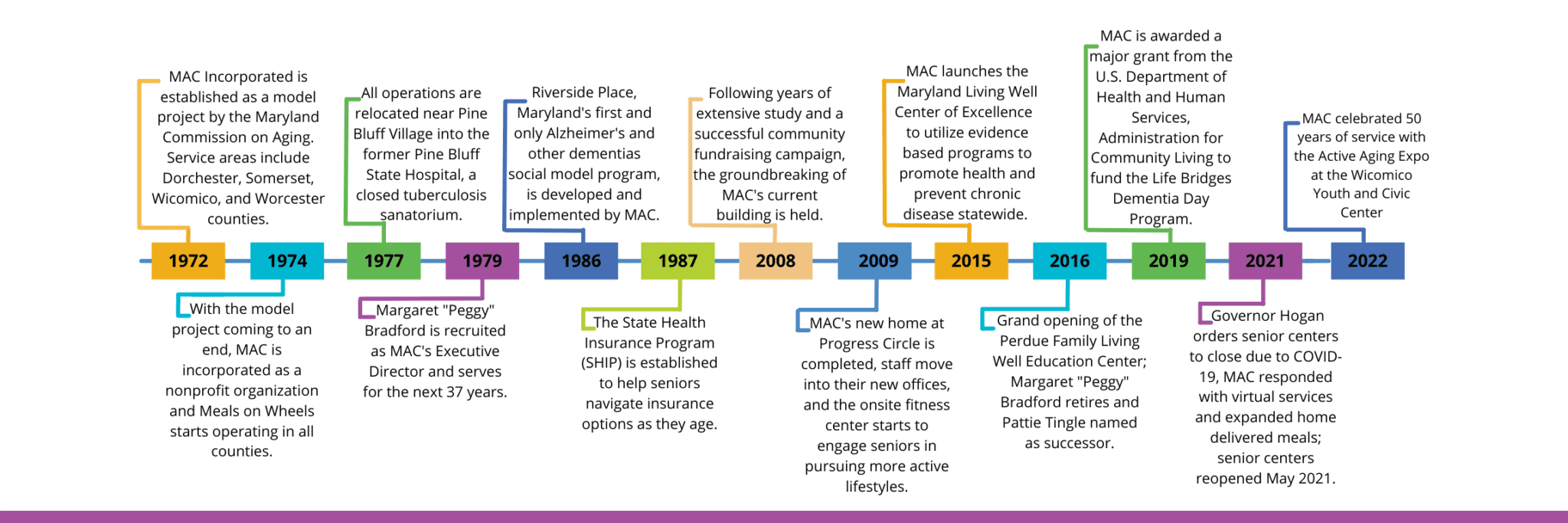Celebrating 50 years of serving seniors
History of MAC
MAC first opened its doors in 1972 when it was established as a model project by the Maryland Commission on Aging. MAC was one of five national area agency on aging models developed under the Older Americans Act, President Lyndon B. Johnson’s initiative for the country’s elderly citizens. MAC’s planning and service area included Dorchester, Somerset, Wicomico, and Worcester counties.
MAC was operated as a model project until July 1, 1974, when it was incorporated as a non-‐profit organization. No longer operated by the Maryland Commission on Aging, MAC became an independent agency governed by a 16-member volunteer Board of Directors. MAC was charged with identifying the needs of older persons on the Lower Shore and locating resources to meet those needs.
Under this charge, MAC developed nutrition sites and senior centers throughout the four counties. Vehicles were purchased to provide transportation to the senior centers; outreach was conducted to make older persons aware of available services, and in-home care for homebound seniors was put in place. Early senior centers were housed in churches, fire halls, and community buildings. The Area Agency was housed in a large home on Lemmon Hill Lane, behind the Parsons Home in Salisbury. Over the years, state and local funds were tapped enabling the construction of stand-alone senior centers in each county. In 1977 MAC moved to the old Pine Bluff state hospital building where it remained until October 2009 when it moved to the Harry and Jeanette Weinberg Building on Progress Circle, the present location.
MAC contracts with Delmarva Community Services in Dorchester County, and the Somerset and Worcester County Commissions on Aging to provide various senior center and community services. MAC directly operates the Wicomico Connections senior activity centers, prepares the meals for senior centers and Meals on Wheels programs in three counties, and administers many other programs, including the Retired and Senior Volunteer Program (RSVP), State Health Insurance Program (SHIP), Guardianship, Maryland Access Point (MAP), Ombudsman program, caregiver support, and more.
More recent additions to the MAC service network include the Richard A. Henson Wellness Center gym, the Caregiver Resource Center, and the Maryland Living Well Center for Excellence (LWCE). Through the LWCE, MAC has forged partnerships with healthcare institutions and hospitals throughout the state, and now offers evidence-based wellness programs in multiple statewide locations. These programs are designed to help reduce hospital readmission and enhance overall wellness. MAC is a recognized national leader in this field.
MAC has faced many challenges, shifts in funding, and experienced a steady demand for services since 1972. As the older population continues its phenomenal growth, MAC will continue to grow and change to meet the challenges of an aging population.

Shortly after the agency celebrated its 25th anniversary, the Wicomico County Council, under the leadership of Phil Tilghman and Henry Parker, formed a committee to investigate the possibility of relocating MAC from the Pine Bluff location to either an existing building or the construction of a new facility. The committee members visited a number of senior centers in Maryland and Delaware. The group saw property in the greater Salisbury area including empty downtown facilities, a building in the Industrial Park and even looked at a structure at WinterPlace Park. No existing structures were suitable without extensive and expensive remodeling. Building from scratch proved to be equally challenging.
Momentum was lost and the possibility of relocating MAC seemed to fade away. A chance appeared during a meeting to discuss the future prospects for a parcel of land behind the Holly Center. Maryland State Delegate Norman Conway proffered the idea of a partnership between MAC and Holly Community Inc., now known as Bay Area Center for Independent Living (BACIL), to allow for the construction of a new building. It was quickly apparent that the agencies had shared values and complementary goals and the partners moved forward with the project.
After an extensive fundraising campaign and more than a year of construction, The Harry and Jeanette Weinberg Building welcomed the staff of MAC on Oct. 25, 2009.
It was during this same period, 1997 to 2009, which MAC began to explore a new avenue of programming being developed through Stanford University. The new health and wellness programs were “evidenced based” meaning that they were extensively studied and demonstrated to work. MAC staff traveled to Stanford and were among the first in the state trained.
The evidence-based programming experienced explosive growth. Health and wellness programs became the source of major new funding and resulted in statewide recognition of MAC staff efforts. MAC’s Wellness Program was designated as Maryland’s Center of Excellence in 2015.
A new community partner, the Association for Lifelong Learning (ALL), approached MAC about the construction of classroom space in 2014. Donations totaling more than $1.2 million dollars allowed for the construction of three classrooms and two new offices. Since the wing opened in August 2015 demand for the space has grown dramatically, for use in classes, conferences, meetings and more.
In 2019, MAC received a three-year $1,000,000 grant from the Administration for Community Living to fund a social model respite and caregiver support program for Alzheimer’s and dementia patients and their caregivers. The program, Life Bridges, includes a day respite center, caregiver support groups, educational activities, and an assistive technology resource center.
Additional growth includes the development of a Care Provider Training Program to help address the shortage of trained entry-level caregivers among home health agencies and congregate facilities, and a continued surge in health and wellness programming.
Now in its 51st year of serving seniors on the Lower Shore, the agency is continually seeking new programs and partnerships that will support MAC’s mission of helping older adults live with dignity and thrive in their homes and community.

